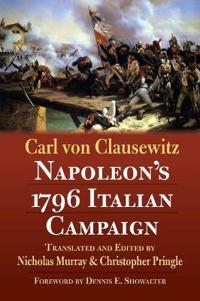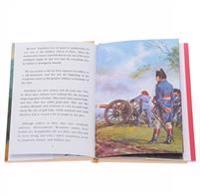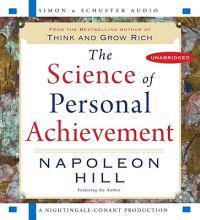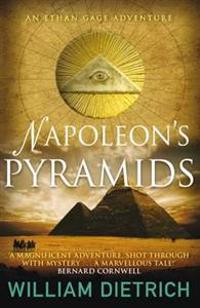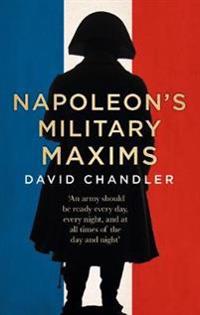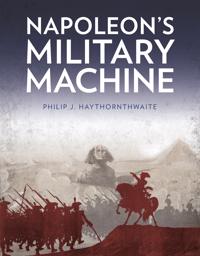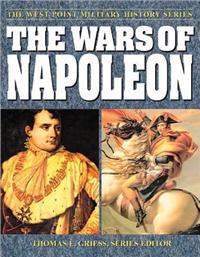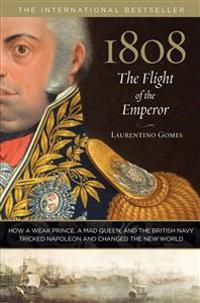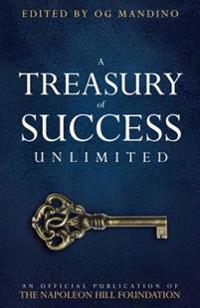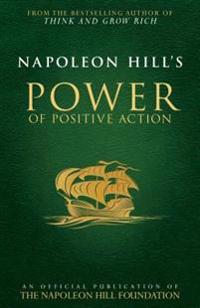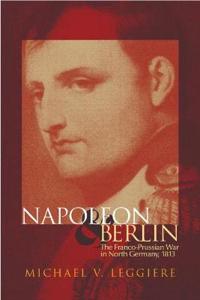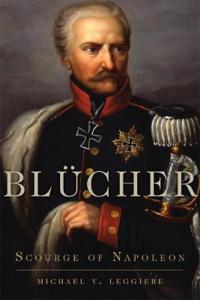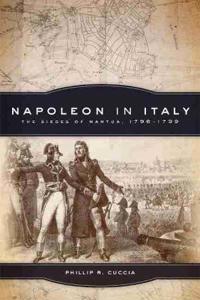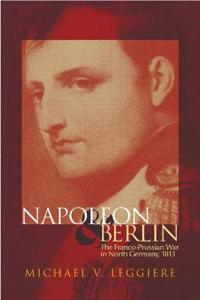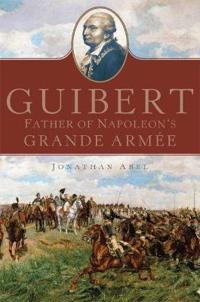Napoleon's 1796 Italian Campaign
ISBN: 9780700626762 - UTGIVEN: 2018-09Carl von Clausewitz (1780-1831) is best known for his masterpiece of military theory On War, yet that work formed only the first three of ten volumes of his published writings. The others, historical analyses of the wars that roiled Europe from 1789 through 1815, informed and shaped Clausewitz's mil[...]
The Death of Napoleon (Inbunden)
avSimon Leys
ISBN: 9780704327863 - UTGIVEN: 1991-09This novel begins with the startling assumption that Napoleon is not dead.
The Story of Napoleon
ISBN: 9780723298014 - UTGIVEN: 2016-04This Ladybird Book about the story of Napoleon is a gem from the Ladybird vintage archive. First published in 1968, this is a classic Ladybird hardback book, packed with information about one of the most famous soldiers in history. This new edition, published alongside the Story of Nelson two hundre[...]
Intelligence in War: Knowledge of the Enemy from Napoleon to Al-Qaeda (CD-bok)
avJohn Keegan
ISBN: 9780739307557 - UTGIVEN: 2003-11A study on the influence of intelligence on war operations examines a series of historical wartime events to delineate the strategies and outcomes of each while linking the function of their intelligence operations, refuting perceptions that intelligence superiority is a key to war success.[...]
Success Through A Positive Mental Attitude (CD-bok)
avNapoleon Hill, W Clement Stone
ISBN: 9780743570978 - UTGIVEN: 200801The authors reveal the secrets of PMA--an amazing way to achieve everything from job satisfaction to good health--in a new edition of the classic self-help manual. Book available.[...]
The Science of Personal Achievement (CD-bok)
avNapoleon Hill
ISBN: 9780743578738 - UTGIVEN: 2008-09Most people have probably experienced fewer failures in life than these famous achievers. Surprising, but true. Each faced repeated setbacks. Yet each became enormously successful. How? Napoleon Hill devoted his life to studying and analyzing the success of more than 500 of the 20th century's greate[...]
Midnight Ghosts (Inbunden)
avNapoleon Hill, Michael J. Ritt
ISBN: 9780746080276 - UTGIVEN: 2006-11Intended for children whose reading ability is beginning to grow, this title helps build confidence and ability. It is part of the "Usborne Young Reading Series Two".[...]
Napoleon (Pocket)
avPhilip Dwyer
ISBN: 9780747566779 - UTGIVEN: 2008-09-01Napoleon Bonaparte's rise to power was neither inevitable nor smooth; it was full of mistakes, wrong turns and pitfalls. During his formative years his identity was constantly shifting, his character ambiguous and his intentions often ill-defined. He was, however, highly ambitious, and it was this r[...]
Napoleon (Inbunden)
ISBN: 9780747574903 - UTGIVEN: 2007-06Napoleon Bonaparte's rise to power was neither inevitable nor smooth; it was full of mistakes, wrong turns and pitfalls. During his formative years his identity was constantly shifting, his character ambiguous and his intentions often ill-defined. As a young and inexperienced general he covered up h[...]
Napoleon's Pyramids (Häftad)
avWilliam Dietrich
ISBN: 9780749009366 - UTGIVEN: 2011-01Revolutionary Paris, 1798. Adventurer Ethan Gage - gambler, sharpshooter and pupil of the late Benjamin Franklin - wins a mysterious medallion in a card game. Within hours he is framed for murder and, facing the grim prospect of either prison or death, he barely escapes France with his life, choosin[...]
Napoleon
ISBN: 9780750961097 - UTGIVEN: 2016-07Why is Napoleon Bonaparte a pocket GIANT? Because he was one of the greatest generals in history. Because he ended the French Revolution. Because he tore up the map of Europe, and reshaped much of the world beyond. Because his legacy echoes to this day.[...]
Napoleon's Military Maxims
ISBN: 9780750964241 - UTGIVEN: 2015-05Packed with insights into the art of war, every military commander or armchair general should have this on their bedside table. This fascinating book guides you through how to wage a war in 78 military maxims from one of history's greatest military commanders. Napoleon's success on the battlefield [...]
Napoleon's Military Machine
ISBN: 9780750969758 - UTGIVEN: 2018-12That Napoleon Bonaparte was one of the greatest military commanders in history is never in doubt. His rise was meteoric, and his successes awesome; and they were founded almost entirely upon military prowess. But the reasons for his successes were many and complex, and did not solely rely on a magne[...]
The Wars of Napoleon (Pocket)
avAlbert Sidney Britt, Thomas E. (EDT) Griess, Albert Sidney Britt
ISBN: 9780757001543 - UTGIVEN: 2003-08A Treasury of Success Unlimited: An Official Publication of the Napoleon Hill Foundation (häftad)
ISBN: 9780768408348 - UTGIVEN: 2015-12A Treasury of Success Unlimited brings together dozens of the best articles from W. Clement Stone, Dr. Norman Vincent Peale, Og Mandino, Napoleon Hill, Ben Sweetland and many other leaders and achievers to share their wisdom and their stories so that you, too, may enjoy success unlimited Reading in[...]
Napoleon Hill's Power of Positive Action (häftad)
ISBN: 9780768410174 - UTGIVEN: 2017-02Those who enjoy the power of positive action accomplish more, have less stress, live with fewer regrets, become more self-disciplined, and demonstrate personal persistence. These qualities contribute to making our unique world a better place to live. We improve the world by simply taking positive ac[...]
Napoleon and Berlin: The Franco-Prussian War in North Germany, 1813 (Inbunden)
avMichael V. Leggiere
ISBN: 9780806133997 - UTGIVEN: 200204At a time when Napoleon needed all his forces to reassert French dominance in Central Europe, why did he fixate on the Prussian capital of Berlin? Instead of concentrating his forces for a decisive showdown with the enemy, he repeatedly detached large numbers of troops, under ineffective commanders,[...]
Blucher: Scourge of Napoleon (Inbunden)
avMichael V. Leggiere
ISBN: 9780806144092 - UTGIVEN: 2014-02One of the most colorful characters in the Napoleonic pantheon, Gebhard Leberecht von Blucher (1742-1819) is best known as the Prussian general who, along with the Duke of Wellington, defeated Napoleon at the Battle of Waterloo. Throughout his long career, Blucher distinguished himself as a bold com[...]
Napoleon in Italy: The Sieges of Mantua, 1796-1799 (Inbunden)
avPhillip R. Cuccia
ISBN: 9780806144450 - UTGIVEN: 2014-04In the center of Mantua, in northern Italy, a covered bridge stretches over the narrow Rio where vendors sell fish from pushcarts just as locals did more than two hundred years ago when Napoleon Bonaparte laid siege to the city. Four cannon balls protruding out of an adjacent wall offer a tacit monu[...]
Napoleon and Berlin: The Franco-Prussian War in North Germany, 1813 (häftad)
ISBN: 9780806146560 - UTGIVEN: 2014-11At a time when Napoleon needed all his forces to reassert French dominance in Central Europe, why did he fixate on the Prussian capital of Berlin? Instead of concentrating his forces for a decisive showdown with the enemy, he repeatedly detached large numbers of troops, under ineffective commanders,[...]
Napoleon in Italy: The Sieges of Mantua, 1796-1799 (häftad)
ISBN: 9780806151847 - UTGIVEN: 2015-11In the center of Mantua, in northern Italy, a covered bridge stretches over the narrow Rio where vendors sell fish from pushcarts just as locals did more than two hundred years ago when Napoleon Bonaparte laid siege to the city. Four cannon balls protruding out of an adjacent wall offer a tacit monu[...]
Guibert: Father of Napoleon's Grande Armee
ISBN: 9780806154435 - UTGIVEN: 2016-10
If there was one man, other than Napoleon himself, who determined the course of the Napoleonic Wars, it was Jacques-Antoine-Hippolyte, comte de Guibert, the foremost military theorist in France from 1770 to his death in 1790. Taking in the full scope of the times, from the ideas of the Enlighte[...]

